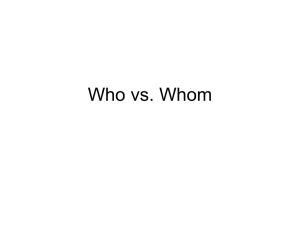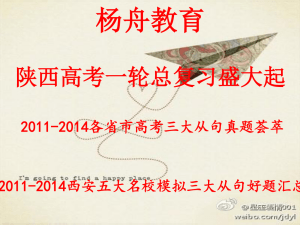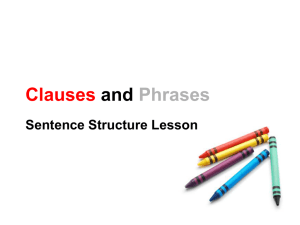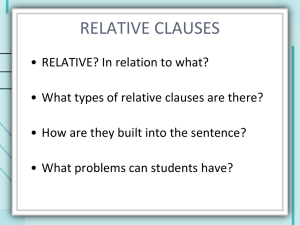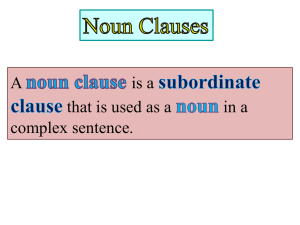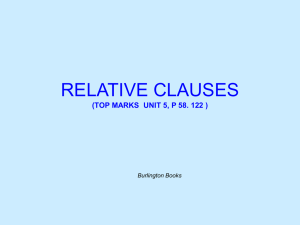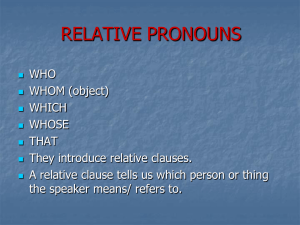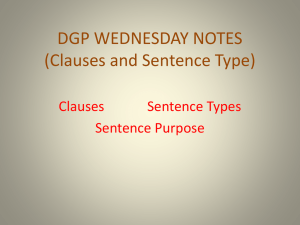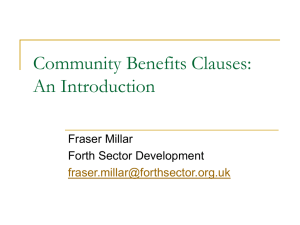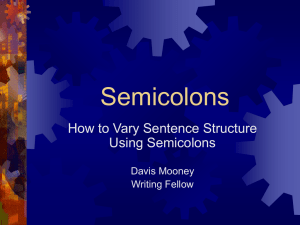ppt
advertisement
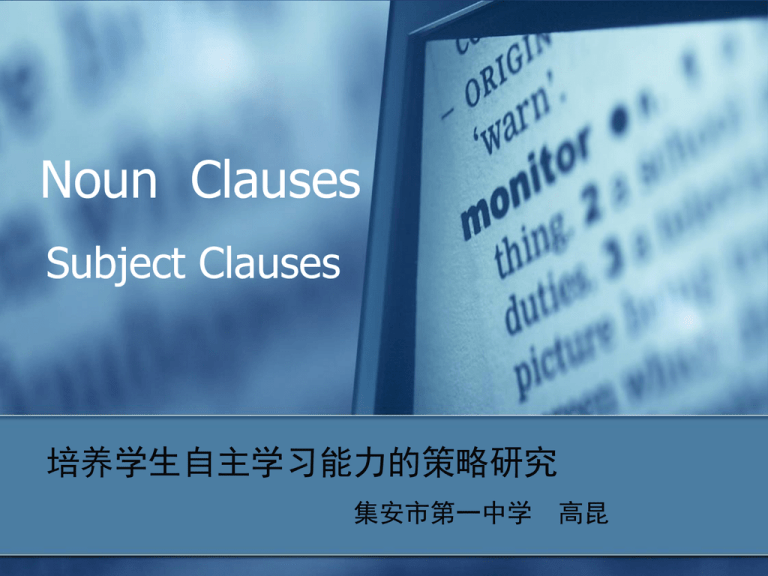
Noun Clauses Subject Clauses 培养学生自主学习能力的策略研究 集安市第一中学 高昆 The structures of a simple sentence S + Vi S + Vt + O S+V+P S + Vt + Oin + Od S + Vt + O + OC Subjects Our plane is taking off in five minutes. To act like that is not polite. All work and no play makes Jack a dull boy. What he has just said is true. That you are leaving is a pity. Subject clauses (that) That you are leaving is a pity. That she is still alive gives us a big surprise. That you are coming to Ji’an is the best news. That he achieved his goal delighted his classmates. Subject clauses (that) that—无词意;不充当从句的成分。 It is a pity that we can’t go. It is certain that she will do well in her exam. It seems that Alice is not coming to the party tonight. It is said that Mr. Green has arrived in Beijing. That in other noun clauses He told us (that) he felt ill. I’m afraid (that) you don’t understand what I said. He has made it clear that he will not give in. My uncle says (that) he has worked here for 20 years and that he is going to retire next month. I do not doubt that he will succeed . (Note : I doubt whether/if he will succeed.) Have you heard the news that Mary will be back? (Note : Who told you the news that was printed in the newspaper yesterday?) That in noun clauses that—无词意;不充当从句的成分。引导宾语从句 时,有时可以省略。 Note: 1.有形式宾语时不可以省略; 2.引导两个及以上宾语从句时,第二个开始不可以 省略; 3.doubt的否定句及疑问句用that引导,肯定句用 whether/if引导; 4.that引导同位语从句时,无词意、不充当成分、 不省略,引导定语从句时,代替先行词、充当从句 的成分。 Subject clauses (whether) Whether it will do us harm or good remains to be seen. Whether she comes or not makes no difference. Whether he will attend the concert doesn’t matter. Subject clauses (whether) whether—有词意,“是否”;不充当从句的 成分。 It remains to be seen whether it will do us harm or good. It make no difference whether she comes or not. It doesn’t matter whether he will attend the concert. Whether / if in other noun clauses I didn’t know whether/if he would attend the concert. It all depends on whether they will support us. I don’t care whether/if he has a holiday or not. Note: Please let me know if you want to join us. Whether / if in noun clauses whether/if —有词意,“是否”;不充当从 句的成分(引导宾语从句时,有时可以用if 替代 whether)。 whether引导所有名词性从句,if只引导宾语 从句。 在宾语从句中,可以用whether ……or not, 也可以用if……or not。 引导介词的宾语从句用whether,不用if。 If可以引导宾语从句,也可以引导状语从句。 Exercises about that/whether/if That ____light travels in a straight line is known to all. that was out that day. It happened ____I He told us (____) that he felt ill. _______ Whether the football game will be played depends on the weather. I don’t care _________he has a holiday or not. whether/if whether It all depends on _______they will support us. Please let me know if you want to join us. Please let me know whether you want to join us. Who, whom, whose, what, which; where, when, how, why Who will stay makes no difference. No one knows who/whom he was waiting for. Do you know whose dictionary it is? What she lacks is experience. Let me know which train you will take. Where I spent my holiday is not important. I want to know when we can visit the museum. How it was done was a secret. I wonder why he behaved like that. Who, whom, whose, what, which; where, when, how, why 各自都有一定的词意,与本身的含义相关; 各自在从句中充当一定的成分。不存在省略 现象。 Compare: Please let me know when you arrive. Please let me know when you will arrive. Subject clauses( whoever, whomever, whatever, whichever, whosever) Whoever comes to the club is welcome. Whomever he likes is very smart. Whatever they could find on the island was eaten up. Whichever you want is yours. Whosever book is lost will be fined. Subject clauses( whoever, whomever, whatever, whichever) whoever,whomever,whatever,whichever—分 别是 who,whom,what,which的强调形式。 一般来说: whoever = anyone who whomever = anyone whom whatever = anything that whichever = anything that Whoever, whomever, whatever, whichever, whosever in adverbial clauses Whoever you are, you can’t pass this way. Whomever you like, you can’t help him in that way. Whatever happened, I must be calm. Whichever book you take, you must sign your name here. Whosever pet it is, it must be examined by the vet. Whoever, whomever, whatever, whichever, whosever in adverbial clauses whoever, whomever, whatever, whichever, whosever在引导状语从句时,表示“无论……”、“ 不管……”。 可以如下替换: whoever = no matter who whomever = no matter whom whatever = no matter what whichever = no matter which whosever = no matter whose Summary that—无词意;不充当从句的成分(引导宾语从句 时,有时可以省略)。 whether—有词意,“是否”;不充当从句的成分( 引导宾语从句时,有时可以用if 替代 whether)。 连接代词和连接副词—各自都有一定的词意,与本 身的含义相关;各自在从句中充当一定的成分;不 存在省略现象。 wh-ever—可以引导名词性从句或者状语从句,而 no matter wh-ever 只能引导状语从句。 Fill in the blanks with “that (twice), how (twice), why, whether .” How _____dinosaurs disappeared is not only a question which interests biologists and geologists. It is a favorite topic for discussion for physicists and why astronomers . They would like to know ____ dinosaurs became extinct because this may help them find ways to solve the problem of global that the earth warming. Some scientists believe ____ slowly became hot and dry dozens of millions of years ago. ____ How the climate changed is uncertain, but water and food supply decreased and so the dinosaurs gradually died out. However, the mammals survived. Other scientists believe ____ that a comet crashed into the earth long ago and caused the disappearance. As a result of this event, a great dust cloud formed in the sky blocking out the sunlight. Without sunlight, most plants soon died and_ so many dinosaur species became extinct. Since the last ice age, the climate of the earth has not changed very much. However, _______ whether the climate will change again is a concern for everybody on earth. Fill in the blanks with “how, that (five times), what (twice).” Before Einstein, what ____ was believed by many that light travelled through space in scientists was ____ a straight line. But after years of research, Einstein suggested ____ that light coming from the stars was bent as it passed the sun. What ____ was suggested by Einstein was so new; it was said ____ that only three people in the world could understand it at that time. The difficulty was ___ how he could prove his ideas to other scientists. that many of the scientists It did not upset Einstein ____ did not accept his ideas. He stuck to his opinion and went on with his research. By 1919, with the astronomers’ support, he had succeeded in convincing them of his theory. He quickly became that word-famous. Now it is generally accepted ____ Einstein was the leading scientist of the 20th century. Complete the story using noun clauses. I am going to tell you an unbelievable story. This afternoon a poorly dressed gentleman came into my restaurant. Nobody knew_____. After sitting down, he ordered a lot of food. He stared at it and then ate it up very quickly. It seemed ____. We wondered _____. We were very surprised _____. To be honest, we doubted _____ . When he was asked to pay the bill, the gentleman asked _____ . Then we were shocked to see _____. Unfortunately, we could not change the bank note as it was too large. So I gave this strange but very rich man a free dinner, in the hope that _____. Homework Compare noun clauses with attributive clauses. Pay attention to: 1.that 2.what Study the usages of when and if, giving some examples. Thank you!
